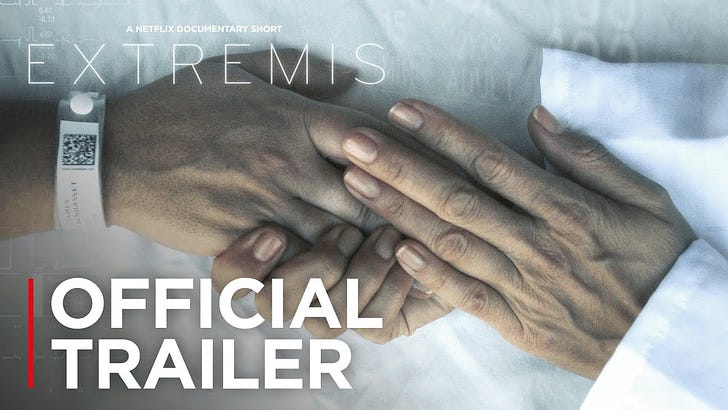Extremis on Netflix: A bioethical viewer guide to the documentary
Warm up your netflix password, this movie is great for End-of-Life discussions.
Extremis is a documentary that you can stream only on Netflix. It was shortlisted for the Oscar for short documentary in 2017. It won the tribeca film festival in 2016 in its category.
The video is short—only half an hour—but so much is packed into that half-hour! Essentially Extremis follows two patients, Donna and Selena and the decisions about whether to extubate (remove the ventilator) them or surgically attach them to a the ventilator via a tracheostomy and the patient moved to a ventilator facility indefinitely.
Neither Donna nor Selena can articulate their wishes. Donna has myotonic dystrophy and her muscles are deteriorating. She is in and out of consciousness. Selena went into cardiac arrest and was revived only after 15-25 minutes “down” that is presumably without any signs of life.
I show this video when I get to chapter 6 of Practical Bioethics, “Dilemmas in End-of-Life.” There are three big lessons I try to impress upon my nursing and pre-med students:
[SPOILERS FOR EXTREMIS FOLLOW]
Listen to the family members and not only what they are saying but what they mean. One of the best things about the film is the very real conversations between Dr. Zitter (the ICU doc) and the patients’ family.
One of Selena’s brothers asks, “Is there any test that will tell us with 100% certainty that she won’t come back from this?” This is really instructive. He’s looking for any reason to keep hanging on. Of course no such test exists, but the reason is important. Death is final. We don’t want to get this wrong.
I think also there is the very real fear that he will only be free from guilt about getting it wrong if he has a test to hang on to as a justification.
In the case of Donna, one of the best things is that at one key point she is able to shake her head “No” when the possibility of putting in a tracheostomy is communicated to her. This provides her loved ones with the justification they need to extubate and let Donna die.
Second, the movie shows the contrast between the principles the family members use to justify their decision and the principles the doctors use. I’m always interested in differences in moral reasoning. Dr. Zitter tells a story about early in her residency when she’s ordered to put a catheter in the neck of a dying patient and a nurse very sarcastically says, “Call the police, they are torturing a patient in the ER.”
(As an aside, this story from a nurse really changed her views so I remind my nursing students of their influence on the others around them)
Zitter is morally distressed by prolonging suffering without benefit (non-maleficence and beneficence). The family members are morally distressed by the finality of making the wrong decision without that 100% certainty (duty to non-maleficence) and also the admittedly being not ready to see the patient die (their own well-being). That’s a very wide gap for decision making.
Selena’s daughter expresses that she thinks Dr. Zitter is too pessimistic because as a doctor, she has seen the worst scenarios. The daughter expresses a deep intuition that removing the ventilator would “Feel like murder to me.” However, she really expresses her deep desires when she says, that “My mother has already made her decision and that’s why she’s still alive [on the vent]. She’s staying alive for me.”
While Dr. Zitter is trying to convince her that extubation is best for her mother because it won’t prolong the suffering, her daughter (who did CPR till they got to the ER) is refusing extubation for very, very different reasons.
Finally, if this impresses anything on all of us, it is we all really need an advanced directive before we find ourselves in a persistent vegitative state or needing what Nicholas Rescher calls “Exotic Lifesaving Treatment.” This is a true regardless of our age. Briefly in the movie, a 38 year old woman must decide whether to go on a ventilator possibly permanently or take comfort measures and die. It can happen to anyone at anytime.
Extremis is a great movie to show the complexity of moral decision making and how our intuitions and emotions can drive our thinking. I think its so important that since I cancelled my netflix during that last price hike, I always ask a student if they are willing to sign into their account so we can watch it.
Let me know in the comments what you think of the movie. I’d love to hear them.
See you in two weeks!




